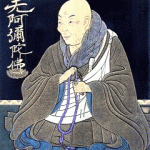Our path is open to all regardless of capacity, belief, moral status, age, race, gender, sexual orientation or nationality. Following the spirit of its 13th century founder, Shinran Shonin, we consider everyone as a “fellow traveler along the path” and each one of us has direct access to the dynamic working of the Great Compassion.

Neither Monastics or Lay People
Unlike other Buddhist denominations, the Shin tradition never had a class of monastics, monks or nuns. However, over the many centuries a priestly class had evolved in Japan within both the Higashi and Nishi Honganji sects. Inspired by the first Shin communities, NASBA offers instead certified lay teachers and instructors who serve as guides along the path. They are not seen as above everyone else, possess special spiritual powers or hold the secret keys to salvation, but are ordinary people, both men and women, who are just more learned or experienced religious seekers. As a whole, Shin associate teachers, ministers, and other certified teachers can marry and raise a family. Family life is not seen as a hindrance to spiritual development but as a natural function of being human. We want all of our members to be fully engaged in this unrepeatable life, participating neither in the ultimate and secular worlds but at the juncture of both dimensions; this is the essence of the Buddha’s Middle Way. It is for this reason, our founder, stated, “I am neither lay nor monk.”
Spiritual Transmission
As mentioned above, Shin Buddhism did not have or need an elite class of religious professionals like monastics or priests. Therefore, spiritual transmission was not passed down from teacher to student but as Shinran Shonin taught, it unfolds as shinjin (the entrusting heart), which manifests directly from the inconceivable working of the Primal Vow of Amida Buddha. Inspired by this teaching, NASBA does not have a category of ordained priests like that is found in Japanese-based Shin or have any rituals of teacher to student transmission like that found in Zen. Likewise, unlike Tibetan Buddhism, we do not have gurus who provide special empowerments to conduct certain practices or confer blessings. We believe that all spiritual endowments cannot be granted by any human to human mystical transmission but can only come directly from the inconceivable Great Compassion, personified as Amida Buddha.
Spiritual Leadership
The flagship community, the Buddhist Faith Fellowship, is the organizational headquarters and its founder, Senpai Daishin, is the guiding teacher of the North American Shin Buddhist Association. The relationship between the flagship sangha is that of mentor to its member communities. All member sanghas are considered independent with it own leadership, bylaws, organization structure and localized practices.
In addition, let it be said that our spiritual growth and spiritual liberation is not dependent on the sanction of any institution. Salvation is not conferred as the result of edicts or prayers from any person but the challenge rests within each of us to deeply listen to the call of the Buddha and diligently follow her path. Although the light of the Great Compassion shines equally upon each of us, we are ultimately responsible for our happiness. This philosophy follows the implicit meaning of the Buddha’s last words, “Work out your salvation with diligence.”
Every member is called to “spiritual leadership” in the practice, teaching, and propagation of the Buddha Dharma, and is personally responsible for the religious life and the well-being of one’s spiritual community. Inspired by the Kalama Sutta, NASBA members are encouraged to use reason, the scriptures, and personal experience in religious life, and never mindlessly and obediently depend on the so-called “interpretation” or “spiritual powers” of religious professionals or spiritual beings.